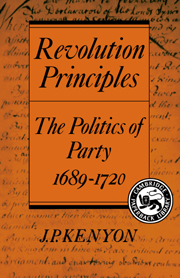Book contents
- Frontmatter
- Contents
- Preface
- Preface to the paperback edition (1990)
- 1 Introduction
- 2 By force or by miracle
- 3 The measure of submission
- 4 This skein of tangled principles
- 5 King Charles's head
- 6 The bloody flag
- 7 Revolution Principles
- 8 Black and odious colours
- 9 The four last years
- 10 That triumphant appellation
- 11 Conclusion
- Appendix
- Abbreviations
- Notes
- Addendum
- Index
3 - The measure of submission
The triumph of de facto theory
Published online by Cambridge University Press: 07 October 2009
- Frontmatter
- Contents
- Preface
- Preface to the paperback edition (1990)
- 1 Introduction
- 2 By force or by miracle
- 3 The measure of submission
- 4 This skein of tangled principles
- 5 King Charles's head
- 6 The bloody flag
- 7 Revolution Principles
- 8 Black and odious colours
- 9 The four last years
- 10 That triumphant appellation
- 11 Conclusion
- Appendix
- Abbreviations
- Notes
- Addendum
- Index
Summary
On the face of it, by the end of 1690 acceptance of the Revolution was almost universal. Only a tiny minority of prominent laymen held out, and the clergy, who had naturally been expected to exhibit greater scruples, had taken the oaths to the new regime in overwhelming numbers. So little was this expected in February 1689 that the Lords had proposed that the clergy be exempted from the oaths altogether.
Yet the non-jurors, headed by Archbishop Sancroft and some of his most respected bishops, made up in distinction for what they lacked in numbers, and polemically they were highly active. The success of Abednego Seller's History of Passive Obedience (1689) was ominous, and in John Kettlewell and Charles Leslie they possessed two of the ablest theological controversialists of the day. Their contention that the oath of allegiance was quasi-sacramental, and could not be abrogated in King James's lifetime, was difficult to counter in a generation which assumed as a matter of course that political forms had been established by Almighty God and were constantly monitored, if not controlled, by Him. Moreover, the oaths to the new rulers had been stripped of any reference to their right or title, and it was well known that many Tory leaders – Nottingham and Rochester, even Danby and Halifax – had only accepted the Revolution as a fait accompli, and had given their allegiance to William and Mary as de facto rulers, without prejudice to James II's continued existence as king de jure.
- Type
- Chapter
- Information
- Revolution PrinciplesThe Politics of Party 1689–1720, pp. 21 - 34Publisher: Cambridge University PressPrint publication year: 1977



